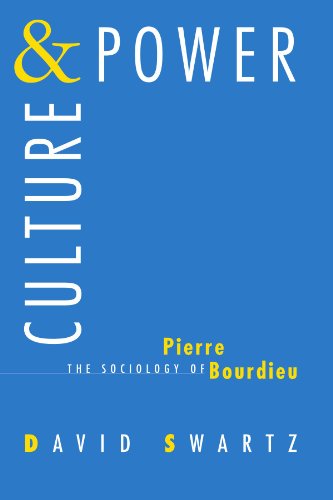Culture and Power: The Sociology of Pierre Bourdieu pdf download
Par cox william le vendredi, août 26 2016, 04:57 - Lien permanent
Culture and Power: The Sociology of Pierre Bourdieu. David Swartz

Culture.and.Power.The.Sociology.of.Pierre.Bourdieu.pdf
ISBN: 0226785955,9780226785950 | 342 pages | 9 Mb

Culture and Power: The Sociology of Pierre Bourdieu David Swartz
Publisher:
The funny thing about such cultural antielitism is how steeped in the work of the left-wing French sociologist Pierre Bourdieu all “real Americans” would appear to be. Pierre Bourdieu developed a paradigm for understanding symbolic power and domination through his theory of dispositional practices that breaks with the concept of ideology and it basis in the tradition of 'Kantian intellectualism'. A second important concept introduced by Bourdieu is that of 'capital', which he extends beyond the notion of material assets to capital that may be social, cultural or symbolic (Bourdieu 1986: cited in Navarro 2006: 16). French sociologist PIerre Bourdieu, who besides coining the phrase "cultural capital" posited a theory of taste based on distinction and the power to consecrate aesthetic judgments of cultural products. According to the book Language and Symbolic Power (1991), cultural capital is “knowledge, skills and other cultural acquisitions, as exemplified by educational or technical qualifications. Bourdieu further explained this concept in In Other Words: Essay Towards a Reflexive Sociology (1994), he thought that “habitus as a property of social agents (whether individuals, groups or institutions) that comprises a Grenfell, M. Following Marx and Webber, Bourdieu suggests the art field as a space of power relations played out by the interests of agents within it. Wright Mills in 1956 called “the power elite.” Mills glanced at journalists and academics, but the main elements . In "The Historical Genesis of the Pure Aesthetic" (in: The Rules of Art) Pierre Bourdieu criticizes sociology's tendency to focus on art consumers while neglecting to study the production of art as field in itself. Cambridge, MA: Harvard University Press, 1991. The French sociologist Pierre Bourdieu approaches power within the context of a comprehensive 'theory of society' which – like that of Foucault – we can't possibly do justice to here, or easily express in the form of applied methods (Navarro 2006 ). Consequently the local communities who created the dance have lost their power as the sole educators and owners of the culture. This theoretical model both deepens and broadens the sociological understanding of symbolic power and domination, through the acknowledgment of non-intellectual and bodily elements in the dynamics of symbolic power mechanisms. Today “the cultural elite” is almost a redundancy — the culture part is implied — while nobody talks anymore about what C. Gino Raymond and Matthew Adamson. To develop its sociological argument this paper adopts an important concept developed in 1977 by Pierre Bourdieu, the renowned French sociologist. Pierre Bourdieu both brilliantly illustrated and bluntly belied his distinctive social theories with a brimful life that, through unlikely twists and long-winding turns, was anchored by an abiding commitment to science, intellectual .